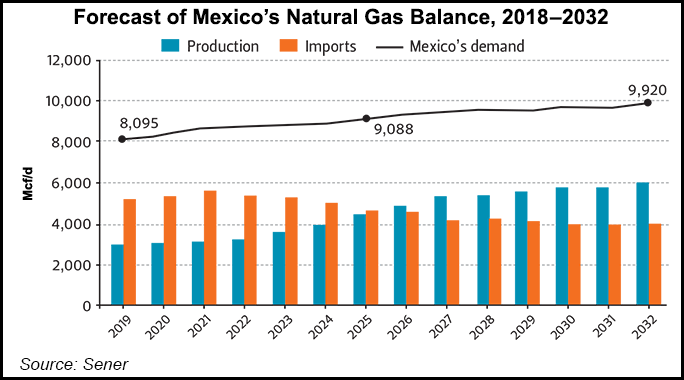Infrastructure | NGI All News Access
TC Energy Warns Mexico Pipeline Spat to Drag Into 2021 if Ongoing Talks Fail
TC Energy Corp.’s management team said during its second quarter earnings call that pipeline arbitration with Mexico over three pipelines in the country could continue on until 2021 if a solution is not found before legal proceedings begin.

“On those arbitration proceedings, under the London Court of Arbitration rules, there are timelines established for the various stages of arbitration, which we would expect would result in hearings sometime in late third quarter or the fourth quarter of next year and that’s assuming no unexpected delays, and then we would expect the decision to follow in the first quarter of 2021,” said Vice President Francois Poirier of Corporate Development and Strategy.
Mexico’s Comisión Federal de Electricidad (CFE) is seeking international arbitration to amend the force majeure clauses of the 25-year firm capacity agreements that it signed for seven pipeline projects that have faced delays, including TC Energy’s 2.6 Bcf/d Sur de Texas-Tuxpan, 886 MMcf/d Tuxpan-Tula, and 886 MMcf/d Tula-Villa de Reyes pipelines.
TC CEO Russ Girling said in the call the company is participating in negotiations as a way to solve the arbitration requests.
“In our view the contracts were properly established in accordance with all original bid and regulatory requirements and remain valid. That said, we remain open to discussions and to resolving these issues.”
Under the force majeure clauses of the seven pipelines, CFE has had to make capacity payments to the developers, despite the pipelines not being in operation. Mexican President Andrés Manuel López Obrador and CFE general director Manuel Bartlett have called the contracts “abusive.”
Girling reiterated that the Sur de Texas-Tuxpan marine pipeline is ready for commercial operations, but the company is waiting on CFE for approval to begin flowing gas. The cross-border pipeline, developed jointly by TC and Infraestructura Energética Nova (IEnova), is a crucial takeaway for U.S. natural gas producers. Meanwhile, Mexico continues to suffer from gas shortages.
The CEO said he hoped the fundamentals of the “cheapest and most reliable” natural gas in the world coming from the southern United States coupled with increasing natural gas demand in Mexico would drive a resolution “to the situation as quickly as possible.”
IEnova CEO Tania Ortiz said in July she does not “see this dragging into next year” and that the Mexico government “has clearly stated that they want to reach an agreement soon.”
A working group has been established in an attempt to resolve the conflict prior to reaching the legal stage, with representatives from the government, business chambers Consejo Mexicano de Negocios (CMN) and Consejo Coordinador Empresarial (CCE), as well as officials from IEnova, TC, Fermaca and Grupo Carso at the table.
Meanwhile, construction of the central segment of the adjoining Tula project has been delayed due to ongoing indigenous consultations and TC now expects that pipe to be completed in 2021. The company had targeted completion for 2020 in its first quarter earnings report.
“We are working closely with a variety of different ministries in the Mexican government and getting good collaboration,” Poirier said. “However, I would say that the negotiations around the potential for arbitration will factor into that timing as well.”
The 178-mile Tuxpan-Tula pipe is meant to transport U.S.-produced gas from Tuxpan, Veracruz state, to power plants in Puebla and Hidalgo states.
“I will point out that both the eastern and western segments of Tula are complete and at once Sur de Texas is flowing gas certainly on the eastern, it will be flowing gas on the eastern part of Tula and hopefully generating some revenue on that part of the system,” Poirer said.
Phased in-service of Villa de Reyes is expected to commence later this year.
On Monday, Texas Gov. Greg Abbott sent a letter to López Obrador urging a resolution of the conflict.
“New pipeline projects and other projects can provide Mexico with an abundant supply of natural gas by safely transporting natural gas from oversupplied Texas to Mexican power plants and manufacturers,” Abbott wrote to López Obrador. “Mexico and Texas will both benefit if your administration can quickly conclude your review and allow the newly constructed pipelines to begin transporting clean natural gas across our shared border.
“Cross-border energy projects will provide important environmental, economic and security benefits for all of North America. They can be a shining example of North American economic empowerment and neighbors helping neighbors.”
TC reported net income of US$827.7 million (C$1.21/share) during the quarter, versus US$590 million (C88 cents) in the corresponding 2018 period.
© 2024 Natural Gas Intelligence. All rights reserved.
ISSN © 2577-9877 | ISSN © 2577-9966 |
